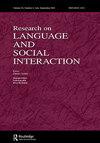非词汇的“呻吟”:桌游互动中的回应哭泣
IF 2.1
1区 文学
Q1 COMMUNICATION
引用次数: 20
摘要
本文研究了棋盘游戏互动中的非词汇发声,重点是“呻吟”。呻吟是一种长时间的、有声音的回应哭声。呻吟是对玩家遭受某种痛苦的游戏事件的反应。尽管抱怨具有抱怨的性质,但游戏行动不会因为抱怨而被撤回,抱怨被视为可笑,而词汇上的抱怨则会引发争论和道歉。这篇文章认为呻吟是贝特森戏剧悖论的一种表现,因为它们表示痛苦,但也表示继续游戏的意愿和对先前事件的确认。呻吟被认为是“这是游戏”的语境化暗示。鉴于呻吟形式的相对非常规性,这些标记被认为是缺乏常规化可能是成员资源而不是问题的证据。本文分析了用英语(加拿大、美国和英国)录制的34小时的棋盘游戏视频(169个代币)。本文章由计算机程序翻译,如有差异,请以英文原文为准。
Nonlexical “Moans”: Response Cries in Board Game Interactions
ABSTRACT This article examines nonlexical vocalizations in board game interactions, focusing on “moans.” Moans are prolonged, voiced, response cries. Moans react to game events where the player has suffered in some way. Despite the complaint-relevant nature of moans, game actions are never withdrawn in response to a moan, Moans are treated as laughable, while lexical complaints invoke arguments and apologies. This article suggests that moans are a manifestation of managing Bateson’s play paradox in that they denote suffering but also willingness to continue play and a validation of the prior event. Moans are suggested to be a contextualization cue for “this is play.” Given the relative unconventionality of the form of moans, these tokens are suggested as evidence that lack of conventionalization may be a members resource rather than a problem. The article analyzes a corpus of 34 hours of video-recorded board game play (169 tokens) in English (Canadian, American, and British).
求助全文
通过发布文献求助,成功后即可免费获取论文全文。
去求助
来源期刊
CiteScore
7.30
自引率
7.40%
发文量
20
期刊介绍:
The journal publishes the highest quality empirical and theoretical research bearing on language as it is used in interaction. Researchers in communication, discourse analysis, conversation analysis, linguistic anthropology and ethnography are likely to be the most active contributors, but we welcome submission of articles from the broad range of interaction researchers. Published papers will normally involve the close analysis of naturally-occurring interaction. The journal is also open to theoretical essays, and to quantitative studies where these are tied closely to the results of naturalistic observation.

 求助内容:
求助内容: 应助结果提醒方式:
应助结果提醒方式:


